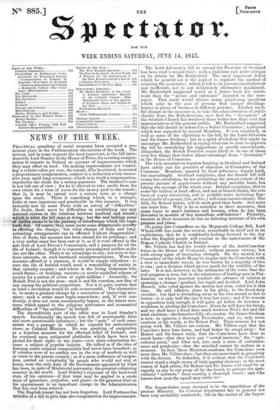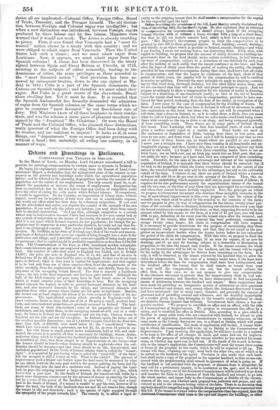The Sugar-duties seem destined to be the opprobrium of the
present Ministry. Its Colonial department has in :general not been very creditably conducted ; but lathe matter of the Sugar- duties all are implicated—Colonial Office, Foreign Office, Board of Trade, Treasury, and the Premier himself. The old distini- tion between Foreign and Colonial sugar was intelligible ; but when a new distinction was introduced, between Foreign sugars produced by slave labour and by free labour, Ministers were warned that it would not work. The device is already tumbling to pieces. First, it was found that Venezuela had a "most fa- voured" nation clause in a treaty with this country ; and we were obliged to admit sugar from Venezuela. Then the United States had such a clause ; and we must admit sugar from Louisiana. Now, it appears, we must admit sugar from the Spanish colonies ! A clause has been discovered in the treaty signed between Spain and Great Britain at Utrecht, in 1713, securing to the subjects of either monarchy, trading to the dominions of either, the same privileges as those accorded to the "most favoured nation " : that provision has been re- newed by subsequent treaties, down to the one signed at Ma- drid in 1814: Cuba is a part of the Spanish dominions, the Cubans are Spanish subjects ; and therefore we must admit their sugar. But Cuba is a great centre of the slave-trade, Brazil alone rivalling her. Yet it must be done. It is reported that the Spanish Ambassador has formally demanded the admission of sugar from the Spanish colonies on the same terms which we give to countries "most favoured" by our free-labour rate of duty. Did Ministers know of all these loopholes in their restric- tions, and was the scheme a mere piece of pleasant treachery de- signed by the " Jesuitical " Mr. Gladstone ? Or were the Board of Trade and the Colonial Office, who planned these distinctions, really ignorant of what the Foreign Office had been doing with Its treaties, and too indolent to inquire? It looks as if, in some things, our " departments " were so many separate governments, without a head ; but, unluckily, all ruling one country, in all manner of ways.



























